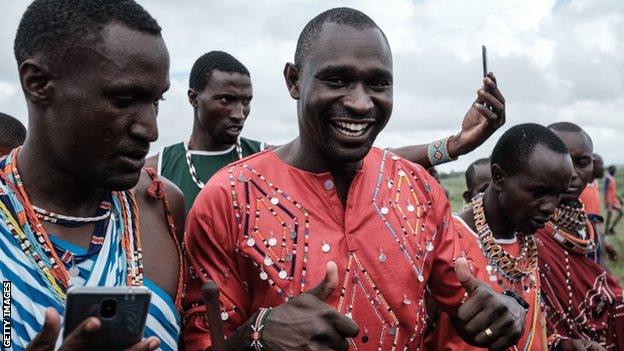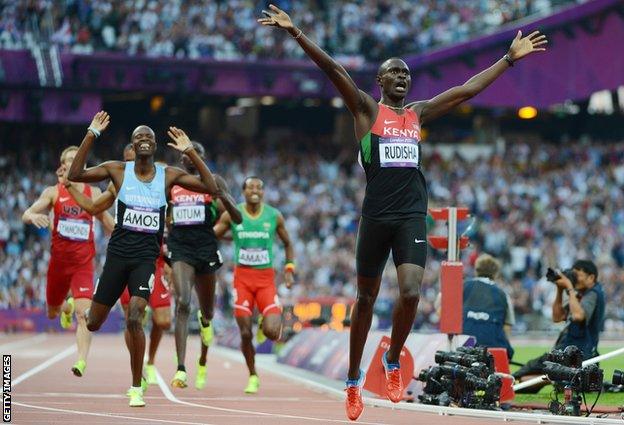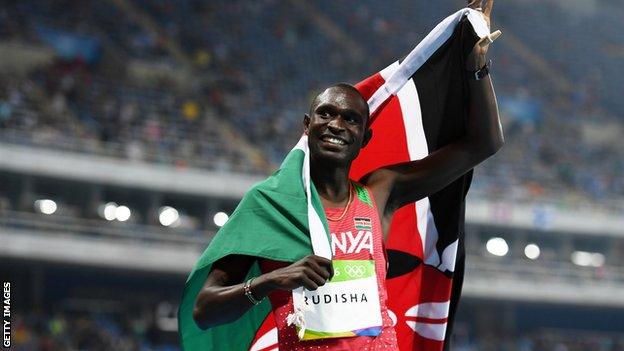David Rudisha: Olympic 800m champion on personal struggles, and Tokyo comeback
- Published
- comments


David Rudisha, pictured in December 2018, attending an event known as the 'Maasai Olympics' at Kimana, near Kenya's border with Tanzania
Snoozing in Nairobi airport's departure lounge in a navy blue suit, David Rudisha looks like just another businessman having a quick power nap.
His fellow passengers seem pretty relaxed about being in the presence of Kenyan running royalty. My feelings are a little different.
Appropriately for a man who has hardly been seen or heard from in the past three years, the two-time Olympic 800m champion Rudisha has been difficult to track down.
But now here we are, finally face to face with the man who, for some, outshone Usain Bolt, external at London 2012. It's a fuller face than you might remember.
By his own admission, the 31-year-old has changed a lot since that incredible world record of one minute 40.91 seconds he set in winning Olympic gold, before defending his crown four years later in Rio.
The initial problem was injury. A long-term issue with the tendon that attaches to the sitting bone means he has not run competitively since 4 July 2017.
But Rudisha has had to cope with a lot more than that.
Marital problems, separating from his wife, plus the death of his father Daniel - himself an Olympic medallist - last year left Rudisha looking for "a bit of destruction to distract".
To release the pressure valve, he was "partying too much". When the injuries finally subsided and he was able to return to running in November, he did so two stone overweight.
And then there is the reason why Rudisha feels he is living a "second chance" at life. He could easily have died last summer.
Five hours into a six-hour drive to his family home in Kilgoris, south-west Kenya, Rudisha rounded a corner late at night to be confronted by a bus on his side of the road. They collided head-on.
His car was a write-off. Recalling the memory, he recoils in his seat.
"Actually I don't even have words to explain the accident," he says. "It was really horrific and scary. It was not easy and everybody, every time, kept asking me: 'How did you even survive? How did you get out of that car?'
"To come out without a single scratch was just like a miracle. It is not something that happens every day, it was so special and I feel like God still loves me."
All of this explains why reducing weight, rather than lap times, is still top of the to-do list. However, a big goal is back on the table: the Tokyo 2020 Olympics.
Rudisha is one of four men to win consecutive 800m Olympic titles. Nobody has won three - at all, let alone in a row.
"I still feel like I still have something in me. I have not exhausted everything," he says.
"There is something left in the tank and that is what I want to exhaust before I think of doing other things.
"If you saw me one month ago I was a little bit heavier, but now I am losing the weight and the response is pretty good. The routine is back. When you miss out on training and competition for two years it is never easy…"
Rudisha trails off. The question of what could happen if the old magic returns is left hanging.
It's a tantalising thought. This is the man who after all, according to chairman Lord Coe, delivered the best performance of the entire London 2012 Olympics.
"Bolt was good, Rudisha was magnificent," Coe said. "That is quite a big call but it was the most extraordinary piece of running I have probably ever seen.
"He had the balls to go in there and think: 'I am so much better than anyone else that I could [run a world record].' In Olympic finals you are not supposed to gamble with the till, but he did."
Rudisha circa 2020 is more circumspect.
The impact of three years of back-to-back injuries undoubtedly informs his current mantra, for which he dips into Swahili: "Pole, pole (slowly, slowly).
"I have had so many setbacks before so I don't want to rush into anything.
"We are human beings, not machines. You cannot have a spare part of your leg or foot or whatever, but we have also to listen sometimes to our body.
"Don't push, just try to be disciplined, doing the right thing at the right time. If the body responds and says yes…"
In an interview with Spikes magazine, external in October, Rudisha was open about turning to partying as a way to release the pressure he felt from his on and off-track issues.
"With everything else going on in my life, the pressure sometimes got to me," he said.

Rudisha's victory in the 800m was one of London 2012's iconic moments
"To release it I'd often hang out with friends, partying too much. It's not something you intend to come your way but sometimes, during periods like that, you look for a bit of destruction to distract yourself."
Four months later he's a little more defensive.
"Well, I, you know, I have never really directly spoken about partying but, you know, just a social life that everybody has the right to enjoy," is how he explains it now.
"Whenever we have a [athletics] meet, sometimes we go to socialise, to go out for instance. That is normal life.
"I never meant anything extreme, because that is not what I do. Mostly I am a very focused person and disciplined. Sometimes when you have friends, you go out and throw a party and so forth, and that is actually what I meant."
Rudisha's penchant for a post-race party is, of course, entirely natural.
But having spent two days earlier that week getting behind-the-scenes access to marathon world record holder Eliud Kipchoge's regime the contrast is striking.
Life in Kipchoge's Spartan training camp in Kenya's Rift Valley is all work and no play. Kipchoge - and 30 other athletes - live in dormitories in Kaptagat from Monday to Saturday. Away from their families and other distractions their life is simple. Train, eat, rest, repeat.
"Eliud's discipline is exceptional," Rudisha says. "If you go back, Eliud can give you his training plan for the past two, three years. I don't think I have something like that."
I ask if that is not his way. Rudisha lets out a big laugh.
"That's not my way. I do things more relaxed," he says.
"I do so passionately. Running is something you have to enjoy sometimes. It is hard but you just have to enjoy and you have to make it look like fun."
To illustrate that more intuitive approach, Rudisha tells an anecdote about his pre-London 2012 training sessions.
His world record time of 1:40.91, set in an Olympic final having already run heats and a semi-final, was arguably as stratospheric as Kipchoge's "moon-landing moment" last year when he became the first man to run a sub two-hour marathon.
However, while Kipchoge had a team of hundreds of support staff who left no stone unturned in their search for perfection - climate, diet, training, trainers - Rudisha's key sessions before London 2012 didn't even feature a stopwatch.
"At a certain point I just needed to do some splits with my mind," he says.
"I gave Brother Colm [his coach, Brother Colm O'Connell] the watch. If I said I wanted to run 400m in 53, 54, 55 seconds I would do it, without the watch. It was amazing.
"That is how I familiarised myself with timing. It was very natural and that is why I really mastered 800m very well, in such a way that I knew exactly what I was running for the first lap. It was just there in my mind."

Rudisha defended his Olympic title at Rio 2016 - and is still the 800m world record holder
It's easy to forget that Rudisha defended his London gold in Rio.
In fact, the man himself made the same mistake during our conversation, talking about winning a second, rather than a third, Olympic title in Tokyo.
That hat-trick would be an incredible athletic achievement for anyone. Given Rudisha's considerable issues both on and off the track for the past three years, it would be nothing short of a miracle.
We met with less than six months to go until the Olympics and Rudisha was yet to set foot on a track. He was still building up his baseline fitness with 10-kilometre runs on the dirt roads around his home in Eldoret.
But, crucially, eight years on from his greatest achievement, one of his greatest gifts has returned.
"I am happy," he says. "I missed the track and I missed training for the past two years. Sport is what I loved in my life. Whenever I am out there and training I feel like I am doing what I really truly love, and I am a passionate about it.
"I know I have missed some of my best years and injury has robbed me. But I am looking forward.
"If I make the team, go to Tokyo, qualify for the final and be in that final, yes I will say I will be standing there as a potential gold medallist, or medallist in that event. But before I get there I cannot start counting things that are not ready yet."
And with that the conversation is over.
"Ladies and gentlemen, flight 8606 to Mombasa is ready for boarding. We apologise for the delay and any inconvenience caused."
The businessmen and women rush to gate three - visibly restless after what has been a lengthy delay.
Not Rudisha. Ticket in hand, he slowly says goodbye and takes time to pose for a picture before joining the back of the queue.
After a three-year lay-off and a second chance at life, what's one more hour's wait?